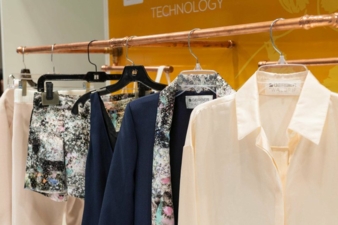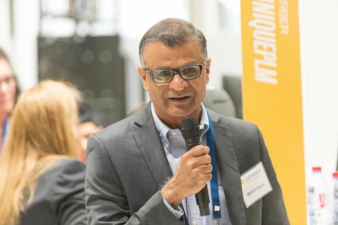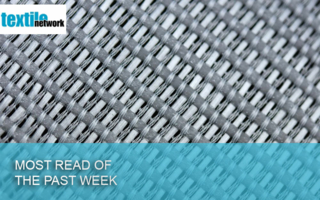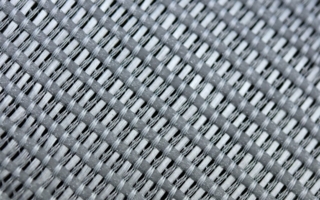21/05/2019 – Gerber Technology — auf Deutsch lesen
Trend panel discussion with experts
At Texprocess 2019, Gerber Technology presented the factory of the future. A panel of experts discussed the opportunities offered by digitalisation.
The concept revolved around the live demonstration of a factory of the future.
For four days, the trade buyers in Hall 4.0 Stand B 31 had the opportunity to learn about the state of the art in innovative apparel production: From 2D/3D design with the latest pattern design software from the AccuMark family, digital textile printing in collaboration with partner Mimaki and “orchestrated in conjunction with the unique print-synchronisation solutions, all the way through to cutting, which showed the development of the best possible pattern ‘just on the cutter’ using Gerber’s ContourVision System,” stated Yvonne Heinen-Foudeh, spokesperson for Gerber in EMEA and South-west Asia.
Innovation everywhere
Gerber Technology, a US CAD/CAM/IT supplier with a German office near Munich, demonstrated in Frankfurt that it has become a feasible reality to develop and produce customised collections or bespoke fashion outfits tailored to individual body measurements (AccuMark MTM) within days, if not hours. This was confirmed by designer Stephanie London with her Waldrip fashion programme, created with the impressive end-to-end solutions from Gerber.
Mohit Uberoi, CEO Gerber Technology speaking to the international press:
“Since its establishment 50 years ago, Gerber’s objective has been to develop automation solutions that enable our users to meet market needs and to operate both efficiently and profitably.”
Highly interesting panel discussion
At present, three important topics are dominating discussions in the industry: digitalisation, customisation and sustainability. These are all areas that Gerber Technology is tackling. A panel discussion featuring high-calibre experts and presented by Yvonne Heinen-Foudeh, debated the question: “From Instagram to Instant Fashion in the world of home interiors and fashion –how does digitalisation help to meet consumer expectations in the field of textile consumer goods?”
Silvia Schöning, Managing Director IACDE:
“If we are to establish the idea of virtual prototyping along with all the benefits of 3D design, it’s time to invest in universities, as well as in training and further training, and in staff skills and competencies at the company level.”
Gerd Müller-Thomkins, Managing Director at the German Fashion Institute (DMI) for womenswear, menswear, childrenswear and inteiror design:
“With the end-to-end process from 2D/3D design to digital fabric printing in collaboration with an industry partner, followed by material cutting, Gerber is showing here at Texprocess, how on-demand concepts for textile products created for the world of ‘living’ can become a reality – all in incredibly quick throughput times that would’ve been unthinkable just a short time ago.”
Ketty Pillet, Vice President Marketing, Gerber Technology:
“The feedback we’ve received from the market shows that our end-to-end solution specifically for the printing sector is meeting the needs of leading fashion brands, enabling them to respond flexibly to fashion trends. Our technologies, also for the bespoke production of small batches, are pointing the way to the future.”
Gerd Willschütz, COO ColorDigital GmbH, Cologne:
“Digitalisation is paving the way for flawless, precise colours and surfaces – an important issue for the first users of innovative technologies in the fields of fashion and home living. As far as I know, Gerber also caters for the furniture industry. It takes time for the users of our technology and services to change their way of thinking and to realise that, when developing furniture or fashion, they don’t really need to physically feel the textiles.”
Gerber turns 50
As an industry pioneer and market leader for the past 50 years, Gerber showed in Frankfurt how its end-to-end solutions have passed the acid test, revealing the “Waldrip Collection”, a collaboration between Gerber and designer Stephanie London. Each piece was designed, developed and produced with the end-to-end solutions from Gerber. Several garments were manufactured using Gerber’s unique digital print workflow that enables bespoke garment production at high speeds whilst employing sustainable practices. Other pieces were produced with integrated small batch production workflows, enabling the designer to adapt to trends and scale production to accommodate the demands of consumers.
End-to-end solution
Gerber exhibited the industry-leading, integrated end-to-end solution that seamlessly transitions from design to print to cut. The company also presented a number of its latest integrated technologies, such as the newest releases of YuniquePLM product lifecycle management software, as well as AccuMark, the industry-leading pattern design, grading, marker making and production planning software, AccuMark 3D and AccuPlan.
Gerber also showcased how data can be passed seamlessly to the cut room to industry 4.0 enabled smart machines like the Gerberspreader XLs series and the Gerber Paragon line of multi-ply Gerbercutters that can process a job with the simple scan of a barcode.
“Smart Textiles Micro-Factory”
In addition to its stand, Gerber was an integral contributor to the “Smart Textiles Micro-Factory” exhibit, located in the passageway between Halls 4.1 and 5.1. The microfactory produced a smart pillow from design through to production.





